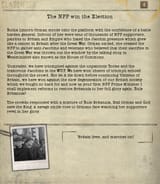Search Results
6/18/2025, 2:55:17 AM
Snap Elections: Brownshirts Seize Parliament
April 8, 1933
In the wake of the Automation Crisis, the Tory-led coalition has crumbled under the weight of its own contradictions. Beset by isolationism, intra-party sabotage, and growing resentment among both industrialists and laborers, the coalition finally collapsed last month, forcing His Majesty to dissolve Parliament and call for immediate elections.
Few expected what came next.
The National People's Party, popularly known as the Brownshirts, has surged to power, achieving a clear majority across the constituencies. Once considered a fringe movement of veterans and right-wing agitators, the NPP has now secured the reins of the Empire.
Led by Rotha Linton-Orman, a former military scout turned political firebrand, the NPP campaigns on promises of national rejuvenation, imperial reassertion, and sweeping "reforms" for the British worker. Their platform is aggressively nationalist, technocratic, and staunchly pro-automation, promising to expand mechanization across all sectors, regardless of union opposition.
Linton-Orman herself is a figure of fascination and anxiety. Rumors persist of her dependence on alcohol and narcotics, her erratic behavior in private, and her volatile temperament in meetings. And yet, her war record, populist charisma, and ruthless political instincts have earned her unwavering loyalty among the Brownshirts.
The Brownshirts have branded the unionists and rioters as "communist saboteurs," undermining the Empire from within. Socialist parties failed to gain traction during the election, their message drowned out by the NPP's fusion of futurism, patriotism, and industrial backing.
Behind closed doors, civil servants whisper about the end of liberal governance. The press, now wary of government oversight, treads carefully. Across the Empire, colonial administrators await their instructions. In the streets, the Brownshirts march openly, their uniforms crisp, their discipline precise.
April 8, 1933
In the wake of the Automation Crisis, the Tory-led coalition has crumbled under the weight of its own contradictions. Beset by isolationism, intra-party sabotage, and growing resentment among both industrialists and laborers, the coalition finally collapsed last month, forcing His Majesty to dissolve Parliament and call for immediate elections.
Few expected what came next.
The National People's Party, popularly known as the Brownshirts, has surged to power, achieving a clear majority across the constituencies. Once considered a fringe movement of veterans and right-wing agitators, the NPP has now secured the reins of the Empire.
Led by Rotha Linton-Orman, a former military scout turned political firebrand, the NPP campaigns on promises of national rejuvenation, imperial reassertion, and sweeping "reforms" for the British worker. Their platform is aggressively nationalist, technocratic, and staunchly pro-automation, promising to expand mechanization across all sectors, regardless of union opposition.
Linton-Orman herself is a figure of fascination and anxiety. Rumors persist of her dependence on alcohol and narcotics, her erratic behavior in private, and her volatile temperament in meetings. And yet, her war record, populist charisma, and ruthless political instincts have earned her unwavering loyalty among the Brownshirts.
The Brownshirts have branded the unionists and rioters as "communist saboteurs," undermining the Empire from within. Socialist parties failed to gain traction during the election, their message drowned out by the NPP's fusion of futurism, patriotism, and industrial backing.
Behind closed doors, civil servants whisper about the end of liberal governance. The press, now wary of government oversight, treads carefully. Across the Empire, colonial administrators await their instructions. In the streets, the Brownshirts march openly, their uniforms crisp, their discipline precise.
Page 1
